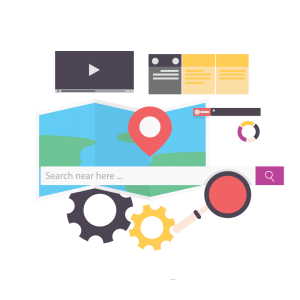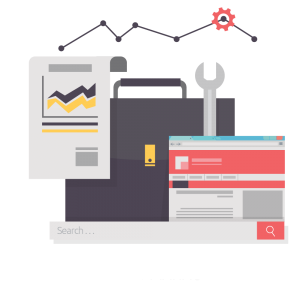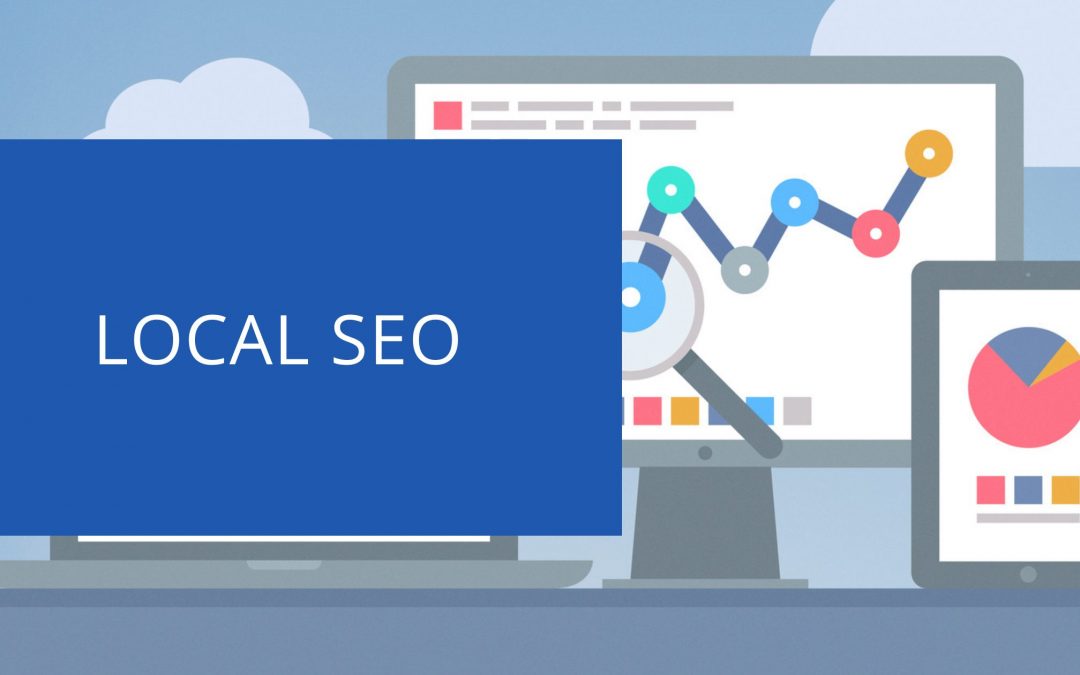There are a lot of people who don’t know how to go about doing local SEO. If you’re one of them, this guide is for you. In it, we’ll teach you everything from how to rank higher in the search engines and get more traffic through what keywords to focus on.
By the end of this guide, you should have a better understanding of what steps need to be taken to increase your rankings and visibility locally.
Contents
What Is Local SEO?
Local SEO is the process of optimising a website for local search results. This includes both on-page and off-page optimisation techniques.
On-page optimisation techniques include adding your business to directories, creating localised content, and using city and state names in your titles and meta descriptions.
Off-page optimisation techniques include building links from local websites and obtaining positive reviews from customers.
If you want to rank higher in the search engines and get more traffic from locals, you need to optimise your website for local search results. In this guide, we’ll teach you everything you need to know about local SEO.
Why Is Local SEO Important for Businesses?
 When done correctly, local SEO can lead to increased traffic for your website. This is because local SEO targets customers who are looking for businesses in their area.
When done correctly, local SEO can lead to increased traffic for your website. This is because local SEO targets customers who are looking for businesses in their area.
If you run a business that serves a specific geographic location, local SEO is essential to your success. It can help you rank higher in the search engines, and it can also help you attract more customers from your local area.
How Does Local SEO Work?
The process of local SEO is fairly straightforward. First, you need to build a website that includes information about your business and the services or products it provides.
Next, you need to optimise that website for local search results by adding markup from Google’s structured data guidelines, building links from relevant websites in your industry, creating unique meta descriptions and titles for each page on your site, uploading videos from YouTube with geo-tagged keywords in their title tags and description tags, etc.
After this step has been completed successfully, all you have left to do is wait for customers who are searching locally.
What Is the Google Map Pack?
The Google Map Pack is a collection of local businesses that appear at the top of the search results for relevant keywords. This pack is usually displayed on mobile devices, and it typically includes three businesses.
If you want your business to be one of the businesses that appear in the Google Map Pack, you need to optimise your website for local search results. In this guide, we’ll teach you everything you need to know about how to rank higher in the search engines and attract more customers from your local area.
How Do I Set up a Local SEO Campaign for My Business?
The first step in setting up a local SEO campaign for your business is to create a website that includes information about your company and the services or products it provides.
Next, you need to add markup from Google’s structured data guidelines, build links from relevant websites in your industry, create unique meta descriptions and titles for each page on your site (make sure they include local keywords), upload videos from YouTube with geo-tagged keywords in their title tags and description tags, etc.
What Are the Best Keywords for Local SEO?
There are several keywords you should be using to optimise your website for local search results. These include city and state names, as well as other related terms such as the types of businesses that operate from those locations.
In addition, it’s important to use geo-targeted keywords in your meta descriptions and titles. For example, if you’re a dentist who practices in London, then one of your title tags might read “London Dentist | North West London Dental Care”. And one of your meta descriptions would say something similar – perhaps: “North West London Dental Care is an affordable dental surgery located at 123 Park Lane.”
The final piece of advice we have on choosing the right keywords for local SEO is this: make sure they are relevant to your business.
Remember that the main goal of local SEO is to attract more customers from your area, so choose keywords accordingly!
When you’re ready to start setting up a local SEO campaign for your business, get in touch with us. We can help you rank higher on Google’s search engine results pages and drive more traffic so you’ll never miss out on another customer again!
What Are the Best Practices for Optimising My Website for Local SEO?
There are many best practices you should follow when optimising your website for local SEO. In this section, we’ll outline some of the most important ones.
 First, make sure that all of your contact information is accurate and up-to-date on your website. This includes your business name, address, phone number, and website URL. You can also add additional information such as opening hours and social media profiles.
First, make sure that all of your contact information is accurate and up-to-date on your website. This includes your business name, address, phone number, and website URL. You can also add additional information such as opening hours and social media profiles.
Second, use markup from Google’s structured data guidelines to help the search engines understand the type of business you operate and what services or products you offer. This will allow them to display your information more prominently on the search results pages.
Third, build links from relevant websites in your industry. The more links you have from high-quality websites, the better your chances of ranking higher in the search engines.
Fourth, create unique meta descriptions and titles for each page on your website. This will help differentiate your business from others who are competing for local customers.
Fifth, upload videos from YouTube with geo-tagged keywords in their title tags and description tags. This will help to improve your visibility on the search results pages.
Sixth, make sure that all of the content on your website is original and relevant to your target audience. Copying and pasting content from other websites will not help you rank higher in the search engines, and may even get you penalised by Google.
Seventh, use keyword research to determine which keywords are most relevant to your business. This will make it easier for you to write content that is closely matched to the types of queries people are using when searching for businesses like yours.
What Are the Best Practices for Creating Local Business Listings and Citations?
To rank higher in the local search results, it’s important to create and claim your business listings on as many websites as possible. This process is known as citation building.
The best way to start building citations is by creating a free Google My Business account. Once you have created an account, you can add all of your company information including your address, phone number, website URL, and opening hours. You can also add photos of your business and tag yourself with relevant keywords.
Next, claim your business listing on other popular directories such as Yelp, TripAdvisor, Foursquare, and Bing Places for Business (and many others!). Make sure that all of the information listed is identical across all of these directories. If there are any discrepancies, Google may not rank your website as high in the search results.
Finally, make sure that all of the information on your business listings is up-to-date and accurate. If any of your contact information changes, be sure to update it on all of your listings immediately.
How Can I Track the Results of My Local SEO Campaign and Measure Its Success?
There are many tools you can use to track the results from your local SEO campaign and measure its success. Some of these include:
- Rank Tracking Tools
- ahrefs
- SEMRush
- Google Analytics
- Social Media Tracking
- Moz Local
Each tool has a free version that is more than enough for most small businesses looking to improve their rankings in the search engines. If you want additional features, there are paid plans available as well.
Our company uses these tools daily to track our clients’ websites and determine which keywords they should be targeting with each blog post or page on their site.
For example, we might find out that one client’s website isn’t ranking very high when people look up “dentists near me” because his address doesn’t include the word “dentists” in it.
That’s why we use these tools to track all of our clients’ listings and make sure they’re set up correctly. If one isn’t, then we’ll contact them directly so that they can update their information with the directory where it is missing or incorrect.
Google Analytics lets us see how many visitors are coming from organic search results on Google for each keyword, while Social Media Tracking tracks which social media platforms are generating the most traffic for a given website.
We use rank trackers to monitor how our clients are doing in the search engine results pages (SERPs) over time and determine which keywords they should be targeting to get better visibility.
How Can You Improve Your Website’s Click-through Rate (CTR) and Organic Search Rankings in Google Maps?
One of the best ways to improve your website’s CTR in Google Maps is by including keywords in your business name.
 For example, if you are a dentist searching for “dentists near me” on Google Maps, you will see three results at the top of the page with phone numbers listed below their names. These listings have high click-through rates because they include relevant keywords in their titles and descriptions.
For example, if you are a dentist searching for “dentists near me” on Google Maps, you will see three results at the top of the page with phone numbers listed below their names. These listings have high click-through rates because they include relevant keywords in their titles and descriptions.
What Are Some Common Mistakes Businesses Make with Their Local SEO Campaigns?
There are many common mistakes that businesses make when they’re starting a local SEO campaign, including:
- Not claiming their business listings on the most important directories: This includes Google My Business, Yelp , Bing Places for Business, and others.
- Not keeping all of their information up to date across directories: If you update something with one directory, be sure to do it with all of them so your rankings aren’t affected in any way.
- Using incorrect or incomplete keywords throughout multiple online platforms: such as blog posts, social media profiles, etc. A good rule of thumb is to use your primary keyword (e.g., “dentists near me”) at least five times throughout each post/profile you create! It also should be mentioned in your business name, address, and phone number if possible.
- Not understanding what keywords are best for their local SEO campaign: This is why it’s important to track which ones are actually driving the most traffic to a given website using rank tracking tools like Google Analytics, ahrefs, SEMRush, etc. so that you can adjust accordingly over time.
Businesses should avoid these common mistakes at all costs because they won’t get the results they’re looking for from their local SEO campaigns otherwise!
10 Local SEO Tips
1. Make sure all of your business information is up to date
Make sure all of your business information is up to date and accurate on the most important directories, including Google My Business, Yelp, Bing Places for Business, and many others (We keep an updated database of the best location listing and directory listings to have).
2. Claim Your Google My Business Listing
Claim Your Google My Business Listing and fill out all of the information as completely as possible.
Include keywords in your business name, address, and phone number whenever possible.
Add photos, videos, and posts to show potential customers what you’re all about and respond to reviews.
3. Ensure that your website is mobile-friendly
Ensure that your website is mobile-friendly so that people can easily find and contact you from their smartphones or tablets.
4. Use local keywords throughout multiple online platforms
Including blog posts, social media profiles, etc. – to increase your chances of being found by those searching for businesses near them.
5. Create location-specific landing pages for the areas you target
Creating the landing allows you to rank in other geographical areas.
Make sure your website’s title tags and meta descriptions are accurately reflecting what you do as a business. Include keywords wherever possible, but make sure they still sound natural.
Do not keyword-stuff! Google is getting smarter every day and will penalise your site if it looks like you’re trying to manipulate its search results.
Utilise social media platforms like Facebook, Twitter, and Instagram to interact with your current customers while also attracting potential ones.
A strong presence on these sites can go a long way when it comes to driving traffic back to your website.
8. Optimise your videos
Optimise your videos for local SEO campaigns by including relevant keywords in the title, description, and tags.
9. Get involved in the local community
Get involved in the local community and attend events whenever possible. This is a great way to network with other businesses, as well as get your name out there.
10. Get and respond to reviews
Last but not least, don’t be afraid to ask for reviews from your customers. This is a great way of showing potential customers that you’re an industry leader and it can give you a significant boost in rankings if done properly.
Be sure to respond to your reviews on your Google My Business listing as it can help boost your map listings position.
Local SEO FAQ
How do I claim My Google Business Listing?
 To claim your Google My Business listing, you’ll first need to verify ownership of the business. This can be done by either mailing a postcard with a verification code to the listed address, or by verifying through a phone call. Once verified, you’ll be able to add all of your business information – including contact info, website URL, hours of operation, etc. – and start interacting with customers through Google My Business.
To claim your Google My Business listing, you’ll first need to verify ownership of the business. This can be done by either mailing a postcard with a verification code to the listed address, or by verifying through a phone call. Once verified, you’ll be able to add all of your business information – including contact info, website URL, hours of operation, etc. – and start interacting with customers through Google My Business.
What are the most important local SEO directories?
Google My Business, Yelp, Bing Places for Business, Facebook, etc. are some of the biggest ones to consider.
How frequently should I be updating my information on these platforms?
Updates definitely need to happen at least once per week if possible! This is one reason why it’s so important to have a designated employee or team member that can take care of this for you since there will always be new places online where your business needs to show up!
Is mobile-friendly really that important when it comes to increasing rankings?
Yes! You want people who see your website listed in search results immediately clicking through and being able to contact you without any issues. If they can’t do that on their mobile device, you’re likely losing out on a lot of potential business.
What’s the best way to go about increasing my website’s rankings over time?
Using rank trackers like SerpFox, SEMRush, ahrefs, and Google Analytics will give you an idea of where you currently stand in comparison to your competitors. From there, it’s just a matter of tweaking certain aspects of your local SEO strategy until you reach the top spot!
Your page titles need to be as descriptive as possible while still sounding natural. Remember that people searching online are likely looking for a particular service or product, so make your business stand out from the rest by including those keywords!
Meta descriptions need to accurately reflect what you do as a company. Do not keyword-stuff! Google is getting better at catching obvious attempts of manipulation, which can lead to penalties against your site.
Social media platforms like Facebook, Twitter, and Instagram all offer great opportunities for connecting with customers in addition to new ones. The more active you are on these sites, the better off your business will be.
What’s the best way to optimise my videos for local SEO?
By including relevant keywords in the title, description, and tags of your videos, you can help them show up higher in search results. Make sure that all of this information is accurate and up-to-date so that potential customers can find them easily!
Is it necessary to attend events within the local community?
Yes! Attending events is a great way to network with other businesses as well as get your name out there. It also helps to build trust and credibility among potential customers.
You can also gain backlinks by being listed as sponsors or attendees to events.
We Offer SEO Services Nationwide
- Chester:https://mediakynect.co.uk/seo-chester/
- Wirral: https://mediakynect.co.uk/seo-wirral/
- Liverpool: https://mediakynect.co.uk/seo-liverpool/
- North Wales: https://mediakynect.co.uk/seo-north-wales/
- Wrexham: https://mediakynect.co.uk/seo-wrexham/
Conclusion
Local SEO is important for businesses of all sizes. By following the tips in this guide, you can improve your website’s visibility in local search results and increase your chances of attracting new customers.
If you’re looking to take your local SEO strategy to the next level, Media Kynect can help! We offer a variety of services that are designed to help businesses like yours reach the top spot in Google’s search results.

